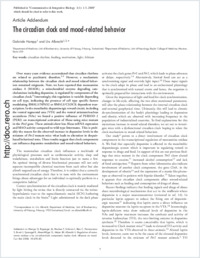The circadian clock and mood-related behavior : addendum to Hampp G. et al., Regulation of monoamine oxidase a by circadian-clock components implies clock influence on mood. Curr Biol 18:678–83, 2008.
- Hampp, Gabriele Department of Medicine
- Albrecht, Urs Department of Medicine
-
2008
Published in:
- Communicative & Integrative Biology. - 2008, vol. 1, no. 1, p. 1-3
English
Over many years evidence accumulated that circadian rhythms are related to psychiatric disorders.1-3 However, a mechanistic relationship between the circadian clock and mood related behaviors remained enigmatic. Now, we have reported that monoamine oxidase A (MAOA), a mitochondrial enzyme degrading catecholamines including dopamine, is regulated by components of the circadian clock .4 Interestingly, this regulation is variable depending on cell type, indicating the presence of cell type specific factors modulating BMAL1/NPAS2 or BMAL1/CLOCK dependent transcription. In the mesolimbic dopaminergic reward circuit, including the ventral tegmental area (VTA) and the ventral striatum/nucleus accumbens (NAc) we found a positive influence of Period 2 (PER2) on transcriptional activation of Maoa using mice mutant in the Per2 gene. These animals show less Maoa mRNA expression and MAO activity compared to wild type littermates. This is probably the reason for the observed increase in dopamine levels in the striatum of Per2 mutant mice what leads to alteration in despair-based behavioral tests. These results suggest that clock components can influence dopamine metabolism and mood-related behaviors.
- Faculty
- Faculté des sciences et de médecine
- Department
- Département de Biologie
- Language
-
- English
- Classification
- Medicine
- Other electronic version
- License
-
License undefined
- Identifiers
-
- RERO DOC 10545
- Persistent URL
- https://folia.unifr.ch/unifr/documents/300764
Statistics
Document views: 146
File downloads:
- pdf: 158
